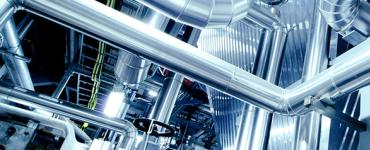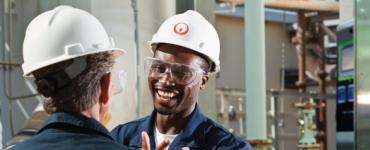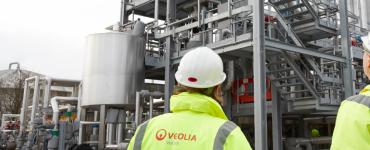- Home
- Latest News
- Has your water treatment system seen better days?

Has your water treatment system seen better days?
We look at the effects of ageing on water treatment systems
Do you have concerns about the performance of your water treatment system? It might be functioning, but is it efficient? The treated water quality and system reliability may be deteriorating, resulting in more frequent periods of downtime? If these are issues affecting you, then according to a market survey of 673 companies, you are among the 40% of users whose systems are over eight years old and getting a bit long in the tooth. At this stage, the decision to "refurbish or replace" comes to the top of the agenda and it's important to understand the options available. This post has been written to explain the effects of ageing on a water treatment system, and how in many cases, refurbishment can be a more cost effective option.
Efficiency & Compliance
An old water treatment system is unlikely to be 100% efficient, even if regularly serviced, which means that you are wasting chemicals and/or electricity, and that is costing you money. Even worse, if the system needs spares that are now obsolete, it could mean extended downtime and lost production. If your business is pharmaceutical manufacture, food and beverage production or healthcare then you will be all too aware how important it is that your system is compliant with the latest standards and guidelines such as cGMP, FDA, CFPP 01-06 and the Renal Association.
If you have an ageing reverse osmosis plant the membranes may need cleaning or replacing. If they are fouled with bacteria, scale or organic matter, this will reduce the permeate output or need an increase in feed pressure to maintain output. Cleaning will usually improve performance and extend the membrane life, but if the permeate quality deteriorates it is quite likely that the membranes have suffered from oxidative attack and may even have pinholes, for which the only cure is replacement. Cation exchange resins in softeners and deionisers are pretty tough and, provided they don't receive more than a trace of chlorine in the feed water, should last for ten years. Anion resins, on the other hand, are less stable and will degenerate over about three years even if they're not used very much. If your service contract doesn't cover media replacement then you should have it tested regularly to ensure that process efficiency is maintained. Loss of treatment capacity and/or deteriorating water quality are very often blamed on ageing plant when, in fact, it's the media and replacement is a quick and easy solution.
Health, Safety & the Environment
In addition to efficiency and compliance, there are other important reasons why you might need to refurbish your system for, and top of the list should be health and safety compliance to the latest legislation. Your water treatment system probably uses chemicals, so you must comply with COSHH legislation: chemical data sheets and notices, method statements, PPE and chemical guards all need to be checked. On the electrical front, cabling, isolators, guards and emergency stop buttons all need to be compliant with the latest regulations. Ageing plastic pipework may become brittle, especially if exposed to sunlight, and this can result in leaks of water or chemicals. And what about the thermostat that controls hot water sanitisation? If that isn't working the system could overheat creating a risk to operators and others working near the pipes. Another key consideration is the environment! All water treatment systems create a waste stream and this has to comply with your discharge consent. Waste water means costs as well as increased mains water consumption. Recent advances in reverse osmosis membranes and ion exchange regeneration systems have reduced chemical consumption and waste water flows. And what about your carbon footprint? Your old reverse osmosis plant will have a throttling valve to control flow which wastes the generated pump head: fitting an inverter drive reduces the power consumption - often by 50% - and that means savings in power costs as well as a reduced carbon footprint.
Good housekeeping
Good housekeeping can help to keep an ageing plant performing to its maximum potential. Calibrate the instruments regularly - if not then you really don't know what's going on. Log sheets recording plant performance day by day are a really good diagnostic tool when something goes wrong, and trending data loggers are even better. There will usually be a troubleshooting guide in the operating manual - maybe you need to re-read it! Your plant supplier or service company should be able to provide advice and help with any refresher training your operators may need to reinforce the complexities and action points that may be needed.
Obsolescence planning
Just like any other piece of machinery, when water treatment systems get old, parts stop working and need to be replaced. The problems start when the availability of spares becomes an issue. If your system is ageing then ask your water treatment supplier for the strategic spares and consumables packs, and get them to notify you of any obsolete parts and recommend alternatives. This may happen anyway as part of your service contract, if you have one. By having critical parts your bases are covered in the event of critical part failure and that means you can plan and budget for your replacement system. Nobody likes surprises and even replacing a small water treatment system is a cost your budget might not be ready for. Obsolescence planning can help you get the most out of your existing system.
Contingency
What happens if the plant does fail? Is your system configured for duty/standby operation or does a pump failure stop the whole system? Raw and treated water storage looks like an unnecessary luxury, but sufficient storage capacity might just give you time to do essential repairs without losing production. A good plan is to provide valved connections in your system so that an emergency mobile plant can be connected in the event of a disaster, or simply for planned maintenance outage.
Healthcheck
So get a health check! A reputable water treatment supplier will provide a free system survey and identify existing and potential problems with your water treatment plant and show you opportunities where refurbishment could improve performance and save you money.This assessment should include: assessing the condition of pipework and vessels; testing valve operation and control; reviewing operational parameters and their history; checking instrument calibration; and sampling and analysis of media. Most important of all it will identify how your water treatment system might be refurbished and help you plan and set budgets as required. A lot of engineers are concerned that undertaking a plant refurbishment will result in downtime and lost production, but your water treatment system can probably be refurbished out of hours. But, if this is not possible there's still no need to worry because a temporary mobile plant will provide a continuous supply of purified water while your water treatment system is off line.
Plan for the future
So, get a health check and plan for the future. Obtain quotes for a new system, including running costs - make sure that this also includes consumables, spares, media replacement and service. Also get a quote for refurbishment of your current system and include any expected reductions in operating costs. You can then make your decision on whether to'refurbish or replace' - but you might be pleasantly surprised to see how best to spend your money.













